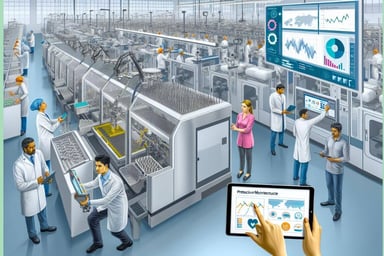AI-Driven Predictive Maintenance to Optimize Procurement Cycles
In the bustling world of medical manufacturing, where precision and efficiency are paramount, the role of a Purchasing Manager is nothing short of crucial. Every decision made, from sourcing raw materials to managing supply chains, impacts the quality and reliability of the final product. In this dynamic environment, staying ahead of the curve is not just advantageous—it's necessary for survival.
Enter AI-driven predictive maintenance—a game-changer that promises to revolutionize procurement cycles in medical manufacturing facilities. By harnessing the power of artificial intelligence, coupled with integration between advanced planning and scheduling (APS) systems like PlanetTogether and enterprise resource planning (ERP), supply chain management (SCM), and manufacturing execution systems (MES) such as SAP, Oracle, Microsoft, Kinaxis, and Aveva, companies can optimize their operations like never before.
Let's look into how this integration can transform the landscape of procurement.

Predictive Maintenance
Traditional maintenance practices in manufacturing often follow a reactive or preventive approach, where equipment is either repaired after a breakdown or maintained at fixed intervals. However, these methods come with their drawbacks—they can lead to unexpected downtime, increased maintenance costs, and inefficiencies in the procurement process.
Predictive maintenance, on the other hand, takes a proactive stance by leveraging data and analytics to predict equipment failures before they occur. By continuously monitoring equipment health and performance metrics, AI algorithms can identify patterns, anomalies, and early warning signs of potential issues. This foresight empowers manufacturers to schedule maintenance activities precisely when needed, minimizing downtime, reducing repair costs, and optimizing inventory management—all of which directly impact procurement cycles.
![]()

The Power of AI Integration
Integrating AI-driven predictive maintenance with APS and ERP/SCM/MES systems unlocks a plethora of benefits for Purchasing Managers in medical manufacturing facilities:
1. Enhanced Equipment Reliability
Imagine a scenario where your production line is equipped with sensors that monitor various parameters of critical machinery. Through seamless integration with APS systems like PlanetTogether and ERP/MES systems like SAP or Oracle, these sensors continuously feed data into AI algorithms. By analyzing this data in real-time, the AI system can predict when equipment is likely to fail and alert maintenance teams well in advance. This predictive approach minimizes unexpected downtime, ensuring consistent production schedules and reliable supply chains.
2. Optimal Inventory Management
Procurement managers face the perpetual challenge of balancing inventory levels to meet demand without overstocking or understocking. AI-driven predictive maintenance offers a solution by providing insights into equipment performance and maintenance requirements. By accurately predicting maintenance needs, companies can optimize spare parts inventory, ensuring that the right parts are available at the right time. This optimization not only reduces inventory carrying costs but also mitigates the risk of stockouts, thus streamlining the procurement process.
3. Data-Driven Decision Making
In today's data-driven world, actionable insights are key to staying competitive. By integrating AI-driven predictive maintenance with APS and ERP/SCM/MES systems, medical manufacturing facilities gain access to a wealth of data insights. From equipment performance trends to supplier lead times, this data empowers Purchasing Managers to make informed decisions across the procurement cycle. Whether it's negotiating contracts, optimizing order quantities, or identifying alternative suppliers, AI-driven insights drive efficiency and cost savings at every step.
4. Seamless Supply Chain Integration
The success of any procurement strategy relies heavily on seamless integration across the supply chain. By leveraging AI-driven predictive maintenance in conjunction with APS and ERP/SCM/MES systems, companies can achieve end-to-end visibility and coordination. Real-time data exchange between manufacturing, procurement, and logistics functions enables agile decision-making and rapid response to changing market conditions. Whether it's adjusting production schedules to accommodate supplier delays or optimizing shipping routes to minimize costs, integrated systems ensure a synchronized supply chain ecosystem.

Implementation Considerations
While the benefits of AI-driven predictive maintenance are undeniable, successful implementation requires careful consideration of several factors:
1. Data Quality and Integration
The effectiveness of AI algorithms hinges on the quality and availability of data. Purchasing Managers must ensure that relevant data, including equipment performance metrics, maintenance records, and supply chain information, is accurately captured and integrated across APS and ERP/SCM/MES systems. This may require investing in data infrastructure, sensor technology, and integration platforms to facilitate seamless data exchange.
2. Cross-Functional Collaboration
AI-driven predictive maintenance is not just a technological initiative—it's a cultural shift that requires collaboration across departments. Purchasing Managers must work closely with maintenance teams, production planners, IT specialists, and external vendors to ensure alignment and buy-in at every level. Clear communication, shared objectives, and cross-functional training are essential to fostering a culture of innovation and continuous improvement.
3. Scalability and Flexibility
As medical manufacturing facilities evolve and grow, so too must their predictive maintenance capabilities. Purchasing Managers should evaluate AI solutions that are scalable and adaptable to changing business needs. Whether it's expanding predictive capabilities to new equipment types or integrating with additional ERP/SCM/MES systems, flexibility is key to future-proofing procurement operations.
In medical manufacturing, staying ahead of the curve requires a proactive approach to procurement. AI-driven predictive maintenance, integrated with advanced planning and scheduling systems like PlanetTogether and ERP/SCM/MES systems such as SAP, Oracle, Microsoft, Kinaxis, and Aveva, offers a transformative solution. By harnessing the power of data and analytics, companies can enhance equipment reliability, optimize inventory management, drive data-driven decision-making, and achieve seamless supply chain integration.
As a Purchasing Manager, embracing this technology-driven paradigm shift presents an opportunity to not only optimize procurement cycles but also drive innovation and competitive advantage. By investing in AI-driven predictive maintenance and fostering cross-functional collaboration, you can pave the way for a future where efficiency, reliability, and agility are the cornerstones of medical manufacturing excellence.
Embrace the power of AI-driven predictive maintenance and embark on a procurement transformation journey that will shape the future of your organization. Are you ready to take your manufacturing operations to the next level? Contact us today to learn more about how PlanetTogether can help you achieve your goals and drive success in your industry.
Topics: PlanetTogether Software, AI-Powered Predictive Maintenance, Integrating PlanetTogether, Data-Driven Decision-Making, Optimal Inventory Management, Medical Manufacturing, Enhanced Equipment Reliability, Procurement Cycles




















LEAVE A COMMENT